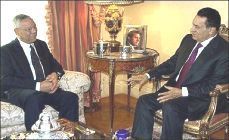U.S. motives over Darfur arouse Arab suspicions
By Tom Perry
CAIRO, July 29 (Reuters) – The Arab League is cautioning the West against threatening sanctions on Sudan over a humanitarian crisis in Darfur, a move some in the Arab world see as a U.S. pretext for toppling another Arab government.
 Sudan says pressure over Darfur, where the United Nations says the world’s worst humanitarian crisis is unfolding, aims to undermine the country’s Islamist government, whose thawing ties with Washington have been put back on ice over the issue.
Sudan says pressure over Darfur, where the United Nations says the world’s worst humanitarian crisis is unfolding, aims to undermine the country’s Islamist government, whose thawing ties with Washington have been put back on ice over the issue.
“Many would say that the U.S. administration, as well as some European countries, have found in the Darfur crisis a long lost pretext to put the government under the sword of international sanctions,” Arab League spokesman Hossam Zaki said, adding an embargo would not help resolve the crisis, but antagonise Khartoum.
A U.S.-drafted U.N. resolution, on which the Security Council will vote on Friday, implicitly threatens Sudan with sanctions should the government not fulfil pledges to disarm Arab militias and provide aid workers relief access.
The U.S. Congress has said the Arab militias, known as Janjaweed, are committing genocide against non-Arabs in Darfur, where fighting has displaced one million and killed 30,000.
The Darfur rebels say the government armed and sent the militias against them. Khartoum denies the charges.
Many in the Arab world are angry over the U.S. invasion of Iraq, which toppled Saddam Hussein, and what they see as an unswerving U.S. bias towards Israel at the Palestinians’ expense. They are now questioning Washington’s motives in taking the Darfur issue to the Security Council.
FRAGMENT THE REGION
“How come the Security Council … and those with a humanitarian agenda are so active when it comes to such a situation, when they turn a blind eye to the miserable situation in the Palestinian territories,” Zaki said.
Mohamed Mahdi Akef, head of Egypt’s Muslim Brotherhood, said Washington was using Darfur as part of a plan “designed to fragment all states of the region, the beginning of it (the plan) was in Iraq”.
The United States in 1998 launched missiles at a Khartoum pharamaceuticals plant linked to Osama bin Laden, saying it was making ingredients for chemical weapons. Sudan, which sheltered bin Laden from 1991 to 1996, has been under U.S. sanctions since 1997 for sponsoring terrorism.
But the United States, under the Bush administration, has taken an active diplomatic role in Sudan.
Under U.S. pressure, Khartoum and the southern rebels have made great strides in the last two years towards reaching a final peace deal to end a 21-year-old civil war in southern Sudan, separate from the Darfur conflict. Khartoum has agreed to a southern vote on secession six years after a final deal.
Some Arab writers and politicians are suspicious, however, that the U.S. diplomacy is aimed at splitting the Muslim Arab north of the oil-producing country from the mainly Christian or animist south.
MILITARY INTERVENTION
British and Australian statements of readiness to send troops to Darfur have provoked official concern, although Washington has said talk of military intervention is premature. Sudan’s northern neighbour Libya has said it could not accept the presence of troops from outside the African Union in Sudan, which has said it would fight any foreign soldiers. The Arab League said it was very concerned by talk of such intervention. Zaki said Australia’s troop offer smacks of human rights double standards, especially given that it had voted against a U.N. General Assembly resolution demanding Israel tear down a barrier it is building in the West Bank.
Like Australia, the United States stood with Israel against the measure demanding the Jewish state pull down the barrier in line with a World Court ruling.
But for Kamel Labidi, a journalist who formerly worked at Amnesty International, it is the Arab world which should be accused of applying double standards in dealing with Darfur.
“The Arab world, relentless in its condemnation of western behaviour in Iraq and the occupied Palestinian territories, has with few exceptions, turned a blind eye to the devastation in Darfur,” he wrote in Britain’s Parliamentary Brief.
Abdel-Bari Atwan, editor of the London-based newspaper al-Quds al-Arabi said Arab media, including his paper, had not ignored the Darfur crisis. “Our columnists have been publishing articles condemning what has been going on in Darfur,” he said.
